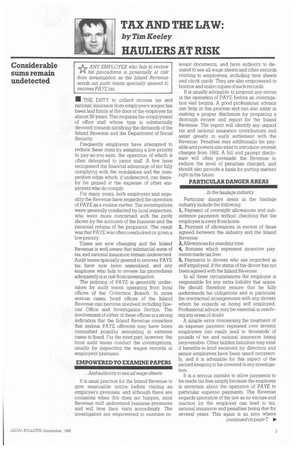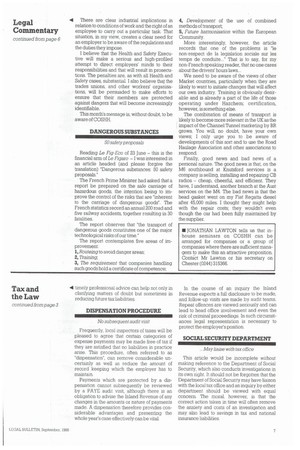TAX AND THE LAW:
Page 111

Page 115

If you've noticed an error in this article please click here to report it so we can fix it.
by Tim Keeley
HAULIERS AT RISK
Considerable sums remain undetected
• THE DUTY to collect income tax and national insurance from employee's wages has been laid firmly at the door of the employer for almost 50 years. This requires the employment of office staff whose time is substantially devoted towards satisfying the demands of the Inland Revenue and the Department of Social Security.
Frequently employers have attempted to reduce these costs by assigning a low priority to pay-as-you-earn, the operation of which is often delegated to junior staff. A few have recognised the financial advantage of not fully complying with the regulations and the competitive edge which, if undetected, can thereby be gained at the expense of other employers who do comply.
For many years, both employers and arguably the Revenue have regarded the operation of PAYE as a routine matter. Tax investigations were generally conducted by local inspectors, who were more concerned with the profit shown by the accounts of the business and the personal returns of the proprietor. The result was that PAYE was often overlooked or given a low priority.
Times are now changing and the Inland Revenue is well aware that substantial sums of tax and national insurance remain undetected. Audit teams specially geared to recover PAYE tax have now been assembled, and any employer who fails to review his procedures adequately is at risk from investigation.
The policing of PAYE is generally undertaken by audit teams operating from local offices of the Collection Branch. In more serious cases, head offices of the Inland Revenue can become involved including Special Office and Investigation Section. The involvement of either of these offices is a strong indication that the Inland Revenue considers that serious PAYE offences may have been committed possibly amounting in extreme cases to fraud. For the most part, however, the local audit teams conduct the investigations, usually by inspecting the wages records at employers premises.
EMPOWERED TO EXAMINE PAPERS
...And authority to see all wage sheets It is usual practice for the Inland Revenue to give reasonable nonce before visiting an employer's premises, and although there are occasions when this does not happen, most Revenue staff understand business pressures and will time their visits accordingly. The investigators are empowered to examine re levant documents, and have authority to demand to see all wage sheets and other records relating to employees, including time sheets and clock cards. They are also empowered to borrow and make copies of such records.
It is usually advisable to pinpoint any errors in the operation of PAYE before an investigation visit begins. A good professional advisor can help in this process and can also assist in making a proper disclosure by preparing a thorough review and report for the Inland Revenue. The report will identify any unpaid tax and national insurance contributions and assist greatly in early settlement with the Revenue. Penalties may additionally be payable and powers also exist to introduce interest charges from 1992. A full and prompt disclosure will often persuade the Revenue to reduce the level of penalties charged, and should also provide a basis for putting matters' right in the future.
PARTICULAR DANGER AREAS ...In the haulage industry Particular danger areas in the haulage industry include the following: 1, Payment of overnight allowances and subsistence payments without checking that the employee is away from home.
2, Payment of allowances in excess of those agreed between the industry and the Inland Revenue.
3, Allowances for standing time.
4, Bonuses which represent incentive payments made tax free.
5, Payments to drivers who are regarded as self employed, if the status of the driver has not been agreed with the Inland Revenue.
In all these circumstances the employer is responsible for any extra liability that arises. He should therefore ensure that he fully understands his obligations and in particular the contractual arrangements with any drivers whom he regards as being self employed. Professional advice may be essential in resolving any areas of doubt.
A simple error concerning the treatment of an expense payment repeated over several employees can easily lead to thousands of pounds of tax and national insurance being recoverable. Other hidden liabilities may exist if benefits-in-kind received by directors and senior employees have been taxed incorrectly, and it is advisable for this aspect of the record keeping to be covered in any investigation.
It is a serious mistake to allow payments to be made tax free simply because the employer is uncertain about the operation of PAYE to particular expense payments. The Revenue regards ignorance of the law as no excuse and inaction by the employer can lead to tax, national insurance and penalties being due for several years. This again is an area where • timely professional advice can help not only in clarifying matters of doubt but sometimes in reducing future tax liabilities.
DISPENSATION PROCEDURE No subsequent audit visit Frequently, local inspectors of taxes will be pleased to agree that certain categories of expense payments may be made free of tax if they are satisfied that no liabilities in practice arise. This procedure, often referred to as "dispensation", can remove considerable uncertainly as well as reduce the amount of record keeping which the employer has to maintain.
Payments which are protected by a dispensation cannot subsequently be reviewed by a PAYE audit visit, although there is an obligation to advise the Inland Revenue of any changes in the amounts or nature of payments made. A dispensation therefore provides considerable advantages and presenting the whole year's case effectively can be vital. In the course of an inquiry the Inland Revenue expects a full disclosure to be made, and follow-up visits are made by audit teams. Repeat offences are viewed seriously and can lead to head office involvement and even the risk of criminal proceedings. In such circumstances legal representation is necessary to protect the employer's position.
SOCIAL SECURITY DEPARTMENT May liaise with tax office This article would be incomplete without making reference to the Department of Social Security, which also conducts investigations in its own right. It should not be forgotten that the Department of Social Security may have liaison with the local tax office and an inquiry by either department should be viewed with equal concern. The moral, however, is that the correct action taken in time will often remove the anxiety and costs of an investigation and may also lead to savings in tax and national insurance liabilities.




















































































































